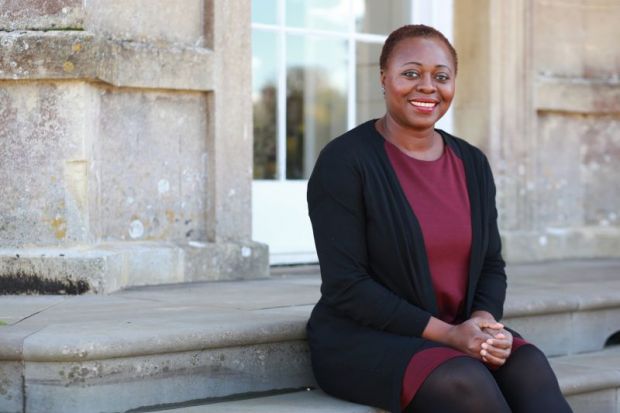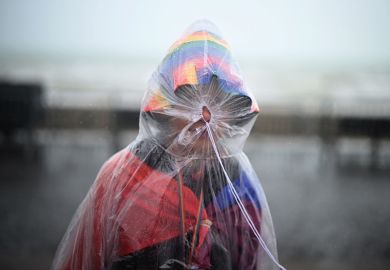A leading black historian has accused the University of Bristol of using her as a “human shield” against criticisms that it has not done enough to confront its links to slavery.
In an emotional Twitter thread, Olivette Otele, who was appointed professor of the history of slavery at Bristol in October 2019, complained that the university “has been using me as a shield in the last [two] years” as it began to examine how it may have benefited from the transatlantic slave trade.
Although the university was founded in 1876 – almost 70 years after the trading of enslaved people was banned in the UK in 1807 – some of the merchant families who helped to establish it may have profited from the slave trade in previous generations, research indicates. The Wills family – after whom the university’s Wills Memorial Hall is named – imported slave-grown tobacco from America until the end of the American Civil War in 1865. One of its student residences, Goldney Hall, is named after the 17th-century trader Thomas Goldney, whose wealth was derived in part from ventures connected to the slave trade.
When asked recently about the Goldney link, a university spokesperson commented that Professor Otele’s research would “inform a review of relevant university building names and the university’s logo to ensure they reflect the university’s vision and values” – a response that prompted one Bristol lecturer, Kirsty Sedgman, to comment that it was “holding up Professor @OlivetteOtele as a human shield to deflect legitimate criticism”.
Responding to the comment on 28 April, Professor Otele agreed, stating that the “uni has been using me as a shield”, adding that her “workload became insane and [did] not compensate by financial reward”.
The Cameroon-born academic, who became the first black woman to be appointed a full history professor in the UK when joining Bath Spa University in October 2018 and who has led the ‘We are Bristol’ reparative justice project examining the city’s colonial legacy, added that she had endured “11 trips to A&E (exhaustion, blood pressure, fainting, and other complications)” related to stress caused in part by alleged back-stabbing from colleagues.
“My time would have been bearable without constant banana skins thrown my way by other academics & ‘allies’ (they know who they are),” she explained, adding that “some were happy [to] use my public profile by association [for] their career while simultaneously sabotaging my reputation inside and outside the uni”.
Professor Otele’s work has gained greater prominence since the toppling of the statue of Edward Colston in June 2020 in Bristol city centre, with her research attracting a £290,000 UK Research and Innovation grant last year.
However, condemning what she saw as “school playground jealousy”, Professor Otele, who will take up a professorship at SOAS University of London, in September, said she had a “toxic” working environment as colleagues sought to criticise her work.
“I ignored them all and even gave some of those people more support so they could feel secure but no, it just wasn’t enough. I dare say they will be happy to see me gone,” she wrote.
Professor Otele, who is vice-president of the Royal Historical Society, claimed that the university “did protect me from that nastiness” but said she had nonetheless faced “vile anonymous letters [which] came from inside” Bristol, which she likened to a “toxic work environment”.
However, she also drew attention to the lack of racial diversity at the university’s history department, stating that it was not until 2020 that the “history department finally got a black scholar…at a university located in city that was involved in the slave trade”.
She was the “[first] one I think [and the] uni doesn’t see [a problem with] not having black academics there”, Professor Otele added.
In a subsequent tweet, she added she “[did] not wish to engage and talk about it further so please don’t invite me to do that in various spaces”.
Judith Squires, Bristol’s deputy vice-chancellor and provost, told Times Higher Education that the university “continues to be extremely proud to have appointed Professor Olivette Otele to the University of Bristol” and was “very grateful to her for the contribution she has made to our community, and to the wider city, over the last three years”.
The university did “recognise that this has been a challenging time for her, and welcome[d] the fact that she has been able to highlight unacceptable behaviours where they exist in our organisation”, added Professor Squires, who said Bristol was “fully committed to addressing those cultural practices that perpetuate the under-representation of black academics at our university”.
Register to continue
Why register?
- Registration is free and only takes a moment
- Once registered, you can read 3 articles a month
- Sign up for our newsletter
Subscribe
Or subscribe for unlimited access to:
- Unlimited access to news, views, insights & reviews
- Digital editions
- Digital access to THE’s university and college rankings analysis
Already registered or a current subscriber? Login










